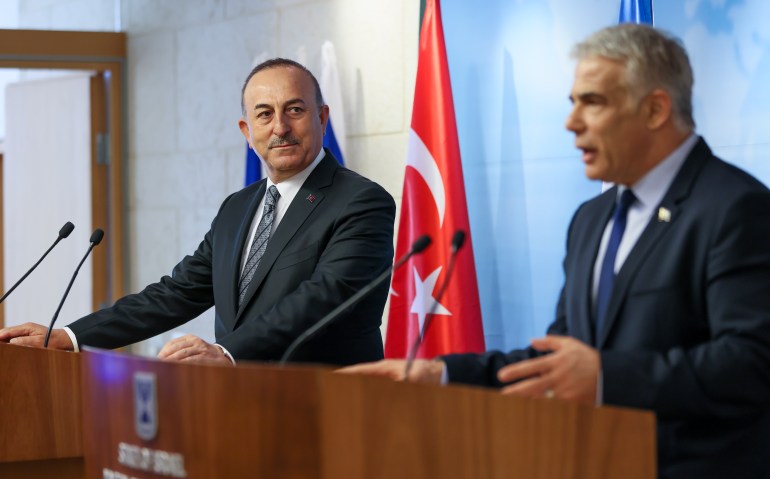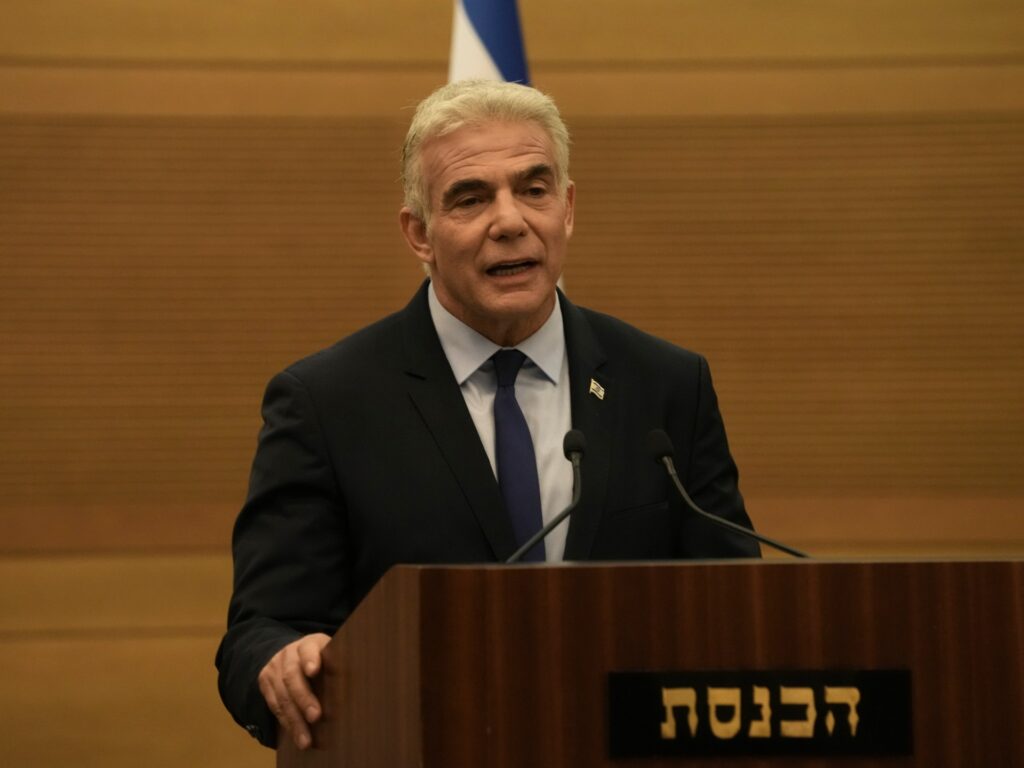ISTANBUL, Turkey – Israel’s top diplomat arrived in Ankara on Thursday amid fierce warnings about Iranian plots to kill or kidnap Israeli tourists on Turkish territory.
His visit comes as Turkey seeks to improve ties with both Israel and Iran.
Foreign Minister Yair Lapid was among the Israeli officials telling travelers to abandon plans to visit Turkey, and instructed those in the country to return home as soon as possible or take shelter in hotels.
Israel has praised Turkey’s cooperation in thwarting the Iranian operation, which it says is retaliation for Israel’s killing of a senior Iranian official in recent weeks, but Turkish officials have been more restrained.
The only word from the Turkish government on the allegations was a foreign ministry statement last week saying Turkey was a “safe country and continues to fight terrorism.”
“Turkey is trying not to take sides in the Iran-Israel conflict, but it is also sending a firm message that it will not allow operations like those allegedly being planned by Iran on its territory,” said Suha Cubuccuoglu, an Istanbul-based geopolitical analyst.
Referring to a visit to Ankara on Wednesday by Saudi Arabia’s de facto ruler, Crown Prince Mohammed bin Salman, he said Turkey was “striving for balance” with the three regional powers.
Over the past year, Ankara has been mending ties with regional rivals including Saudi Arabia, the United Arab Emirates and Egypt, and is also building ties with Israel and Iran.
 Turkish Foreign Minister Mevlut Cavusoglu (left) and Israeli Foreign Minister Yair Lapid hold a press conference [Cem Ozdel/Anadolu]Last month, Foreign Minister Mevlut Cavusoglu became the first Turkish foreign minister to visit Israel in 15 years, following Israeli President Isak Herzog’s visit to Ankara in March.
Turkish Foreign Minister Mevlut Cavusoglu (left) and Israeli Foreign Minister Yair Lapid hold a press conference [Cem Ozdel/Anadolu]Last month, Foreign Minister Mevlut Cavusoglu became the first Turkish foreign minister to visit Israel in 15 years, following Israeli President Isak Herzog’s visit to Ankara in March.
Foreign Ministers Cavusoglu and Lapid paved the way for improved diplomatic, security and economic ties.
“Turkey and Israel are engaged in a normalization process and are making steady progress,” said Galia Lindenstrauss, a senior research fellow at Tel Aviv University’s Institute for National Security Studies.
“Compared with the normalization process in 2016, which took less than two years, it appears that this time both sides have learned from their previous mistakes and have been able to avoid some of the pitfalls so far.”
Further challenges lie ahead
Historically close allies, ties between the two countries frayed in 2010 after Israeli special forces killed 10 Turkish activists trying to deliver aid to Gaza.
Efforts to rebuild ties suffered a setback in 2018 after dozens of Palestinian protesters were killed by Israeli forces.
Israel, meanwhile, accuses Turkey of supporting Hamas, the Palestinian group that controls the Gaza Strip.
Israel and most Western countries consider it a “terrorist” organization, but Turkey does not.
Ankara and Jerusalem face further challenges in the future, Lindenstrauss said, including the collapse of Israel’s coalition government and rising tensions between Turkey and Israel’s ally Greece, as well as a possible renewed Israeli-Palestinian conflict.
While Turkey and Iran have more stable relations, the two countries remain rivals in many conflicts, including in Syria and northern Iraq, Lindenstrauss said.
In Iraq, where Turkey launched its latest military operation against Kurdish fighters in April, Iranian-backed militias have been attacking Turkish bases in recent months, according to U.S. intelligence.
Turkish and Iranian forces are also clashing in Syria, where Ankara is expected to launch a new invasion.
“The Iranian-Turkish rivalry is very well managed,” said Alex Vatanka, director of the Iran program at the Washington-based Middle East Institute.
“There is constant competition from Iraq, Syria, the Caucasus and even the Persian Gulf. Iran watches with jealousy Turkey’s ability to expand into places like Qatar and more recently Saudi Arabia.”
He added: “The Iranians are closely watching where the Turkish-Israeli reconciliation is heading and whether it is directed towards them.”

“Multifaceted Relationship”
Nonetheless, the two countries remain major commercial partners, with trade reaching $4.77 billion in 2021, up 69 percent from the previous year, despite sanctions against Iran and the COVID-19 pandemic.
Citizens of the two countries have enjoyed visa-free travel between the two countries for decades, and Iranians are major real estate investors in Turkey.
“This is a multifaceted relationship and there is intense competition, but neither Turkey nor Iran want this to get out of hand,” Vatanca said.
Amid these complicated diplomatic relations are disturbing Israeli allegations that Iranian agents are searching for, killing and kidnapping tourists.
Israel’s National Security Council has raised the risk level for travel to Turkey to the same as Afghanistan, Iraq, Yemen and Iran, without publicly presenting any evidence.
The threat is believed to be linked to the deaths, including the assassination of a colonel of the Islamic Revolutionary Guard Corps’ elite Quds Force in Tehran on May 22, which Iranian authorities have blamed on Israel.
But the allegations are difficult to verify amid the Israeli-Iranian spat.
“There is intense competition between Iran and Israel, so we don’t have to take what they say at face value,” Vatanka said.



